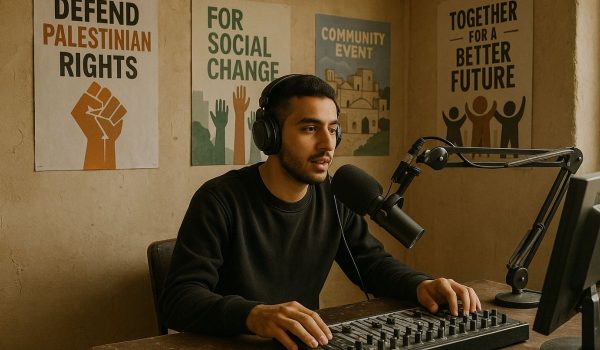In neighborhoods where voices are often silenced or ignored, community radio offers something rare: space. Space to speak, to listen, to connect. From refugee camps to rural towns, these low-frequency stations have become powerful tools for local storytelling, education, and social action.
For many Palestinians and other marginalized communities, community radio isn’t just a medium—it’s a lifeline. It brings people together around shared concerns. It holds up the voices of those who are often left out of mainstream narratives. And it builds bridges between generations, regions, and experiences.
What This Article Covers
This article looks at how community radio serves as a platform for local change. It explores how stations give voice to everyday people, provide space for cultural preservation, and support civic engagement.
You’ll learn how grassroots broadcasters shape content, build trust, and respond to the needs of their communities—all without needing massive budgets or celebrity platforms.
A Voice That Belongs to the People
Unlike commercial stations driven by ratings and advertising, community radio is built for the people who live near it. It is rooted in everyday life. Listeners can hear stories that reflect their own experiences, not just the headlines from faraway centers of power.
Local farmers, teachers, poets, students, and activists become the voices on air. They talk about issues that matter—water shortages, land rights, cultural heritage, health services, education, and more.
That sense of ownership is powerful. It tells people: your voice matters. Your story matters. And the airwaves belong to you, too.
Shaping Narrative from the Ground Up
One of the strongest features of community radio is its ability to shift how stories are told. Instead of being spoken about, communities get to speak for themselves. This makes a real difference in how they are seen—and how they see themselves.
For Palestinian broadcasters, this might mean highlighting local histories, featuring the voices of elders, or airing personal reflections from youth. It means addressing occupation, resistance, resilience, and hope through firsthand perspective—not filtered through distant analysis.
These stories carry weight. They connect emotion to fact. They let listeners hear familiar accents and dialects. And they build archives of truth rooted in the lived experience of the people themselves.
Teaching and Learning Through the Airwaves
Community radio often steps in where formal education may be limited or interrupted. Through interviews, live discussions, and call-in shows, stations offer lessons in everything from civic rights to environmental awareness.
They reach people who may not have access to school, the internet, or printed materials. For listeners in isolated or underserved areas, the radio becomes a classroom.
It also allows for two-way learning. Broadcasters don’t just talk at their audience—they listen, respond, and adapt. When a listener calls in to correct a fact or suggest a new topic, the station evolves. It becomes a living space for shared knowledge.
Cultural Preservation Through Sound
Oral tradition is strong in many communities. Songs, poetry, proverbs, and storytelling have long carried memory and wisdom. Community radio helps protect and share these traditions, even as younger generations grow up with other media.
Stations might air weekly poetry hours, play traditional music, or record interviews with elders. These programs help preserve language, accent, and custom. They make culture accessible—and proud.
They also allow people to hear themselves reflected in positive, grounded ways. In a time when media often flattens or distorts identity, this kind of cultural programming offers something more honest and lasting.
Empowering New Broadcasters
Starting a community radio show doesn’t require formal training. Many programs begin with young volunteers, community organizers, or teachers who learn by doing. This openness allows new voices to emerge and new leaders to grow.
Youth programs are especially powerful. They allow young people to speak about their concerns and hopes, to interview peers and elders, and to build skills in media and communication.
This process not only empowers individuals—it strengthens communities. A generation that knows how to tell its story is a generation ready to lead.
Radio as a Tool for Mobilization
Community radio doesn’t just inform. It mobilizes. Whether calling for a cleanup day, organizing a protest, or encouraging people to vote, local stations have real influence.
Because they are trusted, community stations can reach people quickly and clearly. In times of crisis—natural disasters, political unrest, or health emergencies—this matters deeply.
Radio cuts across barriers of literacy and internet access. It works when power is out, when roads are blocked, and when fear silences other forms of communication. Its reach is quiet but wide.
Trust Built on Consistency
What makes community radio so effective is the trust it builds. That trust doesn’t come from branding or polish—it comes from presence. Listeners know the hosts. They recognize their voices. They believe they will be heard.
That trust allows stations to tackle difficult topics. Mental health, gender equity, generational conflict—these are not always easy to discuss in public. But when handled with care, radio makes it possible.
Through regular shows, respectful language, and space for listener input, stations become trusted companions in daily life. They offer both comfort and challenge, reflection and action.
Growing Change from the Ground
Community radio may not grab global headlines. But it plants seeds that grow quietly and steadily. It changes how people talk to each other. It strengthens local bonds. It gives people the tools to listen, speak, and act.
For communities working toward justice, dignity, and self-determination, this kind of platform is not a luxury. It’s a necessity.
Whether in the hills of the West Bank, the streets of Gaza, or refugee camps abroad, community radio carries voices that refuse to be silenced. And with every broadcast, it reminds us that meaningful change starts by making space to be heard.

